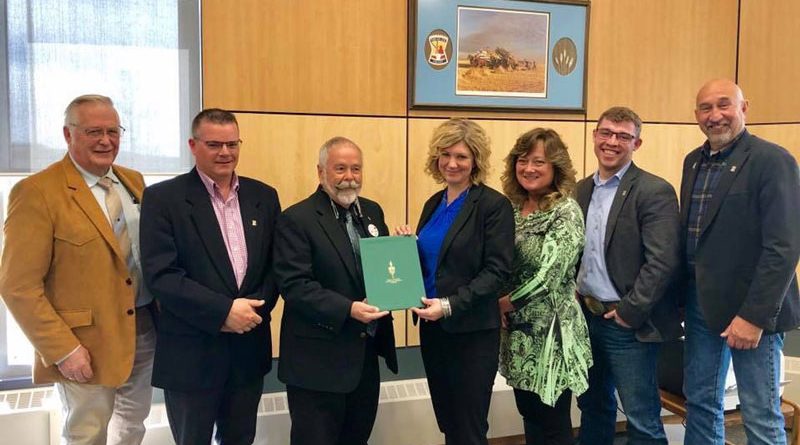Shields discusses Canadian issues with county
By Sharon McLeay Times Contributor
 Martin Shields, the Bow River federal MP, painted a cloudy picture of issues affecting Canada when he met with Wheatland County council on April 16.
Martin Shields, the Bow River federal MP, painted a cloudy picture of issues affecting Canada when he met with Wheatland County council on April 16.
“You heard me say this before, the municipal level of government is the best level we have,” said Shields “You work issue by issue, and decide vote by vote on any particular issue. You are closest to the people you represent.”
He said municipalities can usually fix mistakes more readily at the local level versus the mechanisms at a national level.
He touched on agriculture trade issues and the impact China had on trade in areas of canola.
“People say it’s about science. It’s not about science, it is about politics with canola,” said Shields.
He said if canola is shipped to China, it currently sits in port. China was buying about 40 per cent of Canada’s canola. There is some speculation in the media that the move was made to force Canada to protect Huawei’s CFO from extradition to the United States.
Shields also talked about problems with the durum wheat trade in Italy that reduced exports by about 60 per cent, due to country of origin labelling and negative social media attacks initiated by protectionist lobby groups.
Saudi Arabia also initiated a trade ban for barley, which some attribute to a slight to Saudi egos that a call by Canada made for the improvement of human rights and a rebuke for the murder of journalist Jamal Khashoggi.
India is requiring duties of 30 per cent on imports of lentils, 44 per cent on chickpeas and 50 per cent on peas. Many farmers had switched to pulse crops because indicators showed the market opening for pulse crops in India and Indonesia. India wants incoming pulse crops to be sprayed with methyl bromide to kill pests. There is a push to phase out methyl bromide use due to its effect on the ozone layer. Canada is trying to negotiate with alternative sprays that could be used.
“There are a lot of issues for agriculture, as far as freeing the products that come out of this particular area and it’s not good. Hopefully, some of those things get fixed,” said Shields.
He had his doubts about the signing of the new NAFTA agreement – also known as the Canada–United States–Mexico Agreement (CUSMA) once ratified. He said tariffs for metal manufacturing for aluminum products is affecting local businesses and has a negative effect down the line for farm and municipal machinery costs.
He has concerns that tariff money is not being applied to support those industries, but has not been transparent in its allocation to general revenue (federal government document that shows where tax dollars are spent: www.fin.gc.ca/taxdollar/text/fanfold/pamphlete.pdf.).
Shields said some money that should be delegated to targeted infrastructure for municipalities is unfortunately flowing at a trickle rate.
He related the positives of the one-time gas tax of $2.2 billion, to be directly allocated for short-term municipality support, and he considered this was a positive initiative, rather than having to apply by grant for the money.
He was discouraged about the current government’s spending habits, with little going to repay their $34.1 billion debt load. He said they acquired a $10 billion overage, which was spent, with none applied to the debt.
He said across Canada, Quebec business is booming, but some of the southern Ontario businesses have been negatively affected by U.S. President Trump’s tax policies. It has caused some businesses to relocate to the U.S.
Generally, Shields said Canada’s economy is slowing.
He said on the recent news scandal front, the Liberal government is hoping to delay the SNC-Lavalin issues and the Vice Admiral Mark Norman military information leak trial, until after the election. In his opinion, the public will hear more disturbing information about policies and procedures as the Norman case goes forward.

